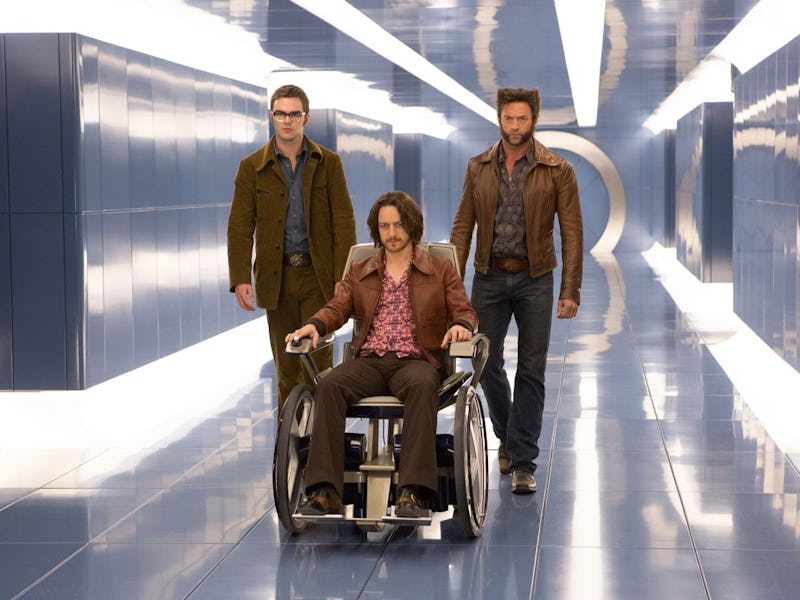With the Marvel Multiverse in Disarray, an Old X-Men Movie Has a Solution
Do you have too many continuities? Try time-travel.

Multiverses and diverging timelines are all over modern superhero movies, but the early Marvel Cinematic Universe was mostly a streamlined, unified franchise unaffected by the common comic-book practice of patching continuity via time travel and alternate dimensions. Before the MCU fully embraced the multiverse in the 2020s, though, another Marvel-based movie provided the perfect template for bringing together disparate elements of a superhero series.
X-Men: Days of Future Past, released 10 years ago, was the culmination of several franchise threads, combining characters from the first three X-Men movies with those of the 2011 prequel X-Men: First Class. Rather than a meticulously planned multi-part narrative, the X-Men movies were a haphazard collection of characters and sometimes contradictory storylines set in different time periods. Director Bryan Singer and screenwriter Simon Kinberg leaned into that mess in the kind of deck-clearing crossover that’s been commonplace in comics for decades.
What’s most impressive is that Days of Future Past delivers a thrilling, emotionally resonant superhero story while applying all its plot fixes, and it rarely feels like it’s just an exercise in resetting the timeline. Drawing inspiration from the classic Uncanny X-Men story arc by Chris Claremont and John Byrne, Singer and Kinberg split the movie between two time periods bridged by Hugh Jackman’s Wolverine.
In the far-flung future of 2023, mutant-hunting robots known as Sentinels have turned the world into a dystopian nightmare, eliminating not only mutants but also any humans who might pass on mutant genes. The X-Men have been reduced to a handful of survivors, led by Professor X (Patrick Stewart) and reformed villain Magneto (Ian McKellen). With the Sentinels closing in, they send a team member back in time to shortly before the Sentinel program’s activation. Wolverine’s healing factor makes him the only one who can endure the process, so the matter-phasing Kitty Pryde (Elliot Page) sends Wolverine’s consciousness back into the body of his 1973 self.
The future X-Men are in trouble.
There, Wolverine tracks down younger versions of Professor X (James McAvoy) and Magneto (Michael Fassbender), who must team up to stop Mystique (Jennifer Lawrence) from assassinating Sentinel creator Bolivar Trask (Peter Dinklage), whose demise merely accelerated the program.
Time travel stories are notorious for their inconsistencies, but Singer and Kinberg lay out clear rules for Wolverine’s trip to the past. Kitty explains that time will continue to move forward in both periods, and that Wolverine's changes will take effect only when his consciousness returns to the future. That simple conceit generates suspense in both timelines, as Wolverine races to stop Mystique while the X-Men work to ward off Sentinels in the future.
Singer and Kinberg have a lot of characters to keep track of, and some of the returning players from the original X-Men trilogy, like Halle Berry’s Storm and Anna Paquin’s Rogue, get left by the wayside. But even their fleeting appearances help establish the movie’s grand scope, and their brief presence is felt. Days of Future Past is much less unwieldy than a movie like Avengers: Endgame, and it finds space for meaningful character relationships, especially between Professor X and Magneto.
Fassbender’s Magneto makes for a capricious ally.
One of the most affecting moments comes when McAvoy and Stewart share the screen, thanks to the elder version of Professor X passing on his wisdom when the younger Professor X probes Wolverine’s mind. McAvoy and Stewart neither look nor sound alike, but in that interaction they convincingly convey the sense of a single person whose worldview has been shaped by decades of struggle and persecution. “I was a very different man,” Stewart’s Professor X tells Wolverine before he travels back in time, and those differences inform the character’s evolution.
Jackman, who’d already been playing Wolverine for nearly 15 years, inhabits the character perfectly, projecting a wiser, calmer version into his younger self. As the only character who sees the entire picture of the past and present, he anchors the story while still experiencing moments of anxiety and rage.
Mystique uses her charms to infiltrate the highest echelons of power.
Days of Future Past is also a bravura action movie with excellent set pieces. The sequence set to Jim Croce’s “Time in a Bottle,” as super-speedster Quicksilver (Evan Peters) takes out bad guys in slow motion, is one of the most famous in the entire franchise. The climax features expert cross-cutting between Sentinel battles in two time periods as the fate of mutant-kind rests in the balance.
Singer and Kinberg weave these threads together so well that it’s a bit disappointing the X-Men franchise continued into two mediocre installments that squandered the clean slate this movie offered. As Jackman gears up to play Wolverine one more time in Deadpool & Wolverine, another multiverse-spanning adventure, Days of Future Past provides a reminder that this kind of stitched-together narrative can also be the source of a rousing, well-crafted action movie.